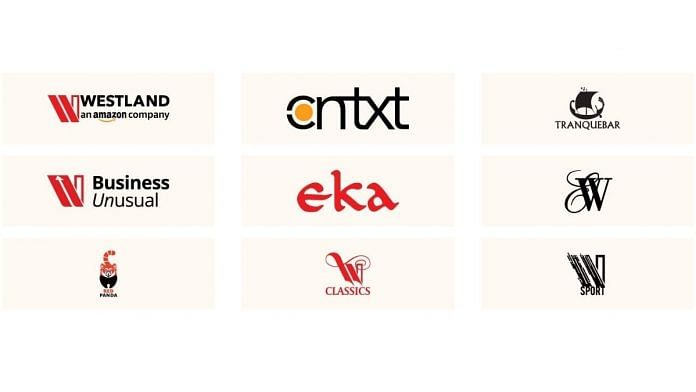After acquiring Westland Books in 2017, Amazon India woke up on 1 February 2022 and decided to pull the plug on the publishing house, as reported by Mint Lounge. The news comes as a major setback to prominent authors like Chetan Bhagat, Amish Tripathi, and Rujuta Diwekar, with the online retailer managing to gather a wide spectrum of responses, ranging from “shocking”, “terrible blow to publishing” to being simply “sad”.
Also Read: Hindi publishers sold no books, fired no staff in lockdown. Now they plan for e-book future
Why join hands with Westland
For publishing houses, famous names matter as much as money, but no one wants to see-saw ‘money’ and books together. From late November 2016 onwards, Westland thought it was on its track to expansion and increased turnover. For Amazon Publishing, the deal would provide the necessary capital, scale, and recognition to compete with multinational publishers like HarperCollins.
For some time, it did. Rid of ‘reluctant owners’ Tata’s Trent Ltd., Westland saw fresh horizons with Amazon’s muscle power — something that was essential for its chicken feed turnover in a market where Penguin Random House stands tall at an estimated Rs 190 crore.
In 2018, Westland, under the patronage of Amazon Publishing, acquired the rights to publish best-selling author Chetan Bhagat’s half-a-dozen books including fiction titles 400 Days, One Arranged Murder, The Girl in Room 105 and non-fiction title India Positive. Sidelining an alleged counter-offer by Rupa Publications, which became the launchpad for Bhagat back in 2004 with Five Point Someone when he was receiving resounding ‘no’s across the board, the author decided to shift under the umbrella of Amazon with a multi-million dollar deal, reportedly the highest signing amount ever given to an Indian fiction writer.
Why did the likes of Chetan Bhagat choose Amazon-backed Westland? The simple logic of wider publicity.
Amazon Publishing is a behemoth for the authors and the ‘author-preneurs’ alike. What started as Jeff Bezos’s bookshop in his parents’ garage became the entry point for authors to shell out their books into the narrowest lanes of small and big cities.
Ask Bhagat about his decision to move on from Rupa Publications, and he says: “Amazon’s online advantage and their commitment to reach every corner of India ties in well with my goals of inspiring every Indian to read books.” Knowing that Amazon Kindle is a classic case of vertical engineering — you buy the product and also the book — this is what Bhagat has to say: “Amazon’s global reach, especially with Kindle eBooks, will give me readers worldwide.”
In a few words, books are the catalysts, but business is the goal. But Westland’s switch of ownership twice within four years and a complete shutdown has a more interesting story to tell. Author and journalist Rasheed Kidwai told ThePrint: “No corporation will say it shut down a publication because it wasn’t profitable. It is only up to us to make guesses.” The chatter in the industry has heated up since then, and there’s a clear verbal jigsaw war to answer why Amazon is bidding goodbye to Westland.
Also Read: Salman Rushdie on Substack is either killing the novel or taking it back to its birth
Westland’s shutdown is ‘shocking’
Business apart, there are reasons for Westland’s members to shake their heads. senior commissioning editor at Simon & Schuster thought it was a “heartbreaking and upsetting day for Indian publishing”, for Westland and its imprints — Context, Tranquebar and Eka — have dolled out some of the most popular best-sellers in the country, including The Shiva Trilogy by Amish Tripathi.
According to Anish Chandy, founder of Labyrinth Literary Agency, the reason for the shock can also be attributed to the fact that the editorial team at Westland was “a genuinely good team, and was doing a good job.” The narrative is supported by The New BJP’s author Nalini Mehta, who added. “Westland and Karthika V.K. have done an amazing job. The decision is unfathomable.”
Also Read: Penguin, Bloomsbury, Juggernaut can wait—Twitter is the new fiction publisher
Guesswork goes on
Those at Amazon Publishing may be silent, but not social media, which is abuzz with authors and readers hedgehogging theories across platforms. On Twitter, conversation on the books churned out by Westland is splitting people into a political tug of war. Writer and journalist Amit Varma shared a list of titles released by the publishing house including Christophe Jaffrelot’s Modi’s India, Aakar Patel’s Our Hindu Rashtra, and Arvind Narrain’s India’s Undeclared Emergency, to throw a politically-flavoured question at Amazon.
These are some of the recent books published by Westland that have been sharing a shelf at home.
They've been shut down today. https://t.co/co36NPsvi1
They've published some of the best & bravest non-fiction of our times. Is that why? pic.twitter.com/KOw3jUGQpM
— Amit Varma (@amitvarma) February 1, 2022
For others, there are doubts as to whether Amazon found it an economically unrewarding business. Rasheed Kidwai thinks Amazon’s decision is “premature”, adding that “In the context of Covid-19 where business is losing so much, corporates should be more patient with authors and editors. Books aren’t consumer-durable items, you can’t mix business and intellect.”
Kidwai also asserts that the decision is more about just authors, for there are as many stakeholders bearing the brunt, including Amazon itself. Westland’s shutdown means shaky ground for associated authors. Anish Chandy agrees, and adds: “it means a lot of uncertainty for authors as well.” The questions that are being asked now are: ‘Who will now have the rights to the titles?’ ‘How will the books in the backlog pan out?’ ‘Where will the author go?’
ThePrint reached out to Amazon Publishing, this article will be updated as and when they respond.
(Edited by Srinjoy Dey)



